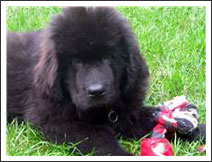FAQs
 How do you pronounce Newfoundland?
How do you pronounce Newfoundland?
In general, the stress is on the LAND, so that NewfoundLAND rhymes with underSTAND. Both d’s are pronounced softly and the New is pronounced like Noo. The foun is pronounced somewhere between fun and feun, (closer to feun) as in “Noufeun(d)LANd.”
Are Newfies good with children?
It’s not surprising that Nana in the original Peter Pan was a Newfoundland. Newfoundlands are renowned for their gentleness, protectiveness and love for children. They are tolerant of behavior by children and are ideally suited as a child’s companion. However, an adult must always protect the Newfie from possible abuse or rough play from a child(ren).
How do I feed my Newf?
Feeding a puppy correctly is extremely important if you want a healthy dog with strong hips. We recommend feeding a balanced diet. Studies have shown conclusively that puppies underfed by 20-25% the first year of their lives are much sounder than puppies allowed to eat all they want. Overfeeding a Newf puppy, in the hopes of growing a bigger dog, can cause serious orthopedic problems. See Caring for a Newfoundland Puppy for more information.
How do I train a Newf puppy?
It’s very helpful to enroll your puppy in training classes at an early age. Early training is never forgotten, and the socialization away from home and with other dogs is very important. Puppy obedience can be started as early as 10 weeks-of-age. Be sure to pick a class where a good motivational method is taught by instructors who are experienced. Puppy training classes are available locally through Denali Dog Obedience School.
A Newf puppy needs to interact with other people and dogs away from home to learn how to be a good citizen. Your puppy should travel with you everywhere especially during the first few weeks. You want your Newf to respond well to your commands (even your suggestions) long before the age of six months when your puppy weighs nearly 100 lbs. Your puppy will use its mouth on everything to investigate. However, by the age of 12 weeks, your puppy should no longer use its teeth on your body.
How much exercise should I give my Newfie?
Exercise should be done moderately and daily. Exercise increases bone density, makes muscles stronger, and helps keep Newfs trim Physically, Newf puppies should be outside off leash playing on natural surfaces at least 60% of their waking hours each day.
Of course, the very best exercise is a daily swim in clean water, and running on a sandy or rocky beach is ideal. If these options are not possible, a safe fenced and spacious yard does the job. Playing with another puppy who is the same size is perfect; they can wear each other out through play.
Avoid slippery floors, lots of stairs, sleeping or playing on concrete (which is very bad for growing bones and muscles), playing with older, heavier dogs, and walking a Newf on leash for exercise (this is called “forced” exercise). Absolutely no wrestling or tug of war games, instead play games such as fetch and hide and go seek with your Newf. Remember, most barking, chewing, stealing and general naughtiness in the home can be prevented with adequate daily exercise, combined with obedience training.
How much do Newfies shed?
Newfies do shed, so someone in your house needs to be committed to grooming. The undercoat is shed at least once per year, known as “blowing coat.” Grooming is extremely important at this time as the dead coat must be brushed out or mats will form.
About ten minutes per day of brushing (a little more during the few weeks of shedding per year) will keep the coat glossy & healthy. Nails should be kept short to protect the feet from splaying. This is particularly important in a giant breed, as the feet support a significant load.
Most Newfoundlands shed significantly in the spring and less severely in the fall.
What common health problems are found in Newfs?
Health problems associated with Newfoundlands, include Hip Dysplasia (a malformed ball and socket in the hip joint), Elbow dysplasia, sub-aortic stenosis (a heart condition) and cystinuria (a hereditary defect that forms calculi stones in the bladder). Some potential problems can be avoided through proper care of your Newfie and puppy training classes. Read more about avoiding growth problems in puppies.
